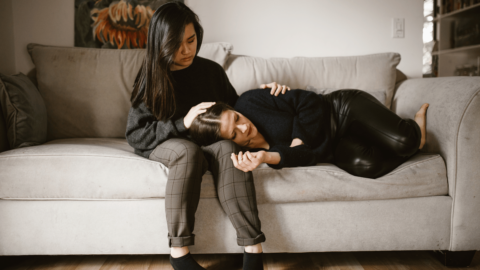According to the Anxiety and Depression Association of America (ADAA), anxiety is the most common mental illness experienced in the United States, accounting for a staggering 18.1% of the population yearly. This means that almost 1 in every 5 Americans experience anxiety disorders.
As mental health awareness grows globally, so has the percentage of people who are on anxiety medications.
Benzodiazepines have long been associated with the treatment of anxiety disorders. While their efficacy is well-established, there is debate about when they should be prescribed, as they are addictive and do not treat the root cause of the condition, only the symptoms.
It is unhelpful to see anxiety disorders solely as a medical diagnosis requiring prescription drugs. Most psychologists advocate for a more holistic approach that also involves non-medication therapies.
Let’s explore some of them here.
Counseling for Anxiety
The symptoms of anxiety are well-known: excessive worry, irritability, sleep problems, and a sense of panic. However, the causes of anxiety can be varied and complex. Anxiety may be triggered by a traumatizing life event, a drastic change, the loss of a loved one, or a combination of factors.
Anxiety medication provides symptom relief but is less effective in addressing the underlying life circumstances contributing to the condition. Talking therapies, such as counseling, allow patients to discuss these life circumstances and explore their reactions to them.
By breaking down these moments, patients can become aware of unhelpful coping strategies and make necessary changes to break the cycle of anxiety. Many patients find talking therapies as effective, if not more so, than medication.
Practicing Mindfulness
“Mindfulness” has become a popular buzzword among health and wellness circles, but its meaning can sometimes be obscured. Mindfulness is about being present in the moment and being aware of your thought processes and reactions as they happen. It is the “simple practice of paying attention” that makes it “the medicine of the moment.”
Mindfulness can be broadly broken down into three key steps:
- Pausing and becoming aware of the present moment.
- Focusing on your breathing.
- Bringing attention to your whole body.
Mindfulness helps treat anxiety because it allows you to almost “catch” yourself before your anxious thoughts blow up. It will enable you to slow down, be aware of any negative responses to stress, and take real-time action to turn that around. Mindfulness is usually actively discussed during talking therapies, so your psychologist or counselor will likely bring it up.
Breathing Exercises
One of the symptoms of anxiety is rapid breathing – patients may feel their chest tightening and start hyperventilating. Proper breathing exercises can help your body slow down and better cope with anxious thoughts.
Many types of breathing exercises can help you cope with anxiety. The main objective is to slow your breathing by inhaling and exhaling slowly. This allows you to calm yourself physically, which then helps to calm yourself mentally.
Deep breathing exercises, such as yoga and pilates, are commonly used in fitness classes. They sound simple but can work wonders when practiced correctly and consistently.
Non-Controlled Medications for Anxiety
If medications are considered for anxiety, physicians should explore non-addictive and non-controlled medications first.
An effective class of medications to treat anxiety on a more long-term basis are selective serotonin reuptake inhibitors (SSRIs) like Paxil (paroxetine), Zoloft (sertraline), Celexa (citalopram), and Lexapro (escitalopram).
Serotonin-norepinephrine reuptake inhibitors (SNRIs) can also be an effective, longer-term treatment for anxiety disorders. Examples of SNRIs are Effexor XR (venlafaxine) or Cymbalta (duloxetine).
Both SSRIs and SNRIs have to be taken daily and are not effective on an ‘as-needed’ basis.
For acute anxiety attacks, hydroxyzine can be a helpful adjunct, particularly when combined with breathing exercises and mindfulness training.
Treating Anxiety: Conclusion
Treatment for mental health conditions is as important as treating physical conditions, leading to happier, healthier lives. The treatment of anxiety is best approached holistically, involving both medication and non-medication therapies. It is advisable to avoid benzodiazepines as a routine treatment approach for anxiety.
Online Counseling with QuickMD
Did you know? QuickMD can treat anxiety online from the privacy and comfort of your home and prescribe anxiety medications online.




